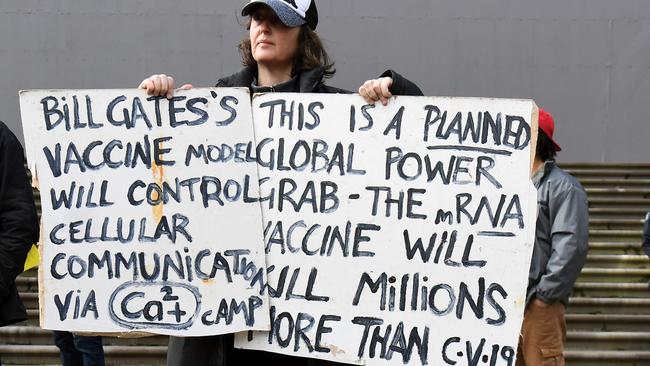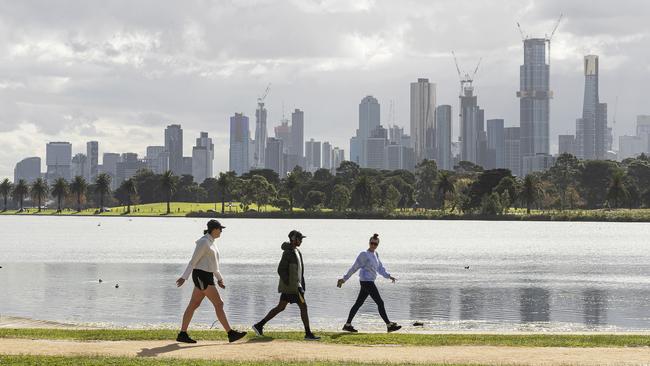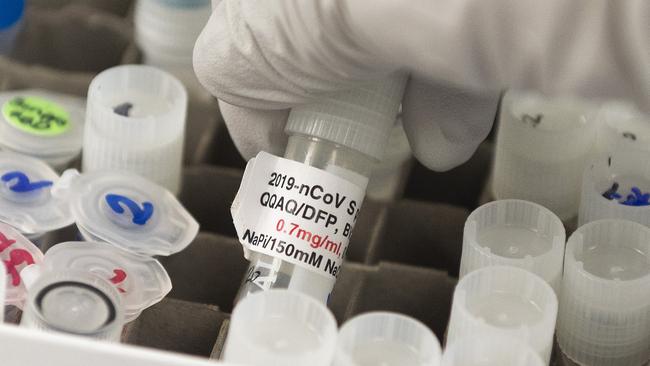Patrick Carlyon: Why we’re still not yet in the deep end
What’s becoming plain now lockdown restrictions are easing is that conspiracies and sinister vaccination programs are not as scary as the real threats posed by COVID-19. What felt like the end seems to be just the end of the beginning, writes Patrick Carlyon.
Patrick Carlyon
Don't miss out on the headlines from Patrick Carlyon. Followed categories will be added to My News.
Poor Bill Gates. The magnate has donated hundreds of millions of dollars to fighting the virus outbreak, yet Melbourne protesters still demand his arrest for imagined crimes against humanity.
Yet blaming Gates will not help. Nor will supposed conspiracies of 5G and sinister vaccination programs.
We need not invent such existential perils. What’s becoming plainer is that the real virus threats are scary enough.
Despite pleasing scenes of normality in recent days, from golfers to grandmas receiving long overdue hugs, a lifting of restrictions is not the beginning of the end. It feels like the end of the beginning.
Clues keep mounting, like markers in the endless list of virus privations, big and small, that come and go. The virus — or at least its effects — isn’t about to recede. Not next week. Not next year.

The inescapable truth has sharpened focus. It defies the dwindling number of new cases in both Victoria and the country. If the panic of March has passed, the prospect of the hardships ahead has hardened.
It’s now not only unwashed protesters who are saying what not long ago sounded like the craziest things. Credible authorities are lining up to provide the bleakest of assessments.
The World Health Organisation has announced COVID-19 might not be eradicated.
“It is important to put this on the table: this virus may become just another endemic virus in our communities, and this virus may never go away,” says WHO’s emergencies director, Mike Ryan. His assessment is a jarring shift from the rhetoric of the opening weeks of the outbreak, when scientists boldly predicted a vaccine would be “12 to 18 months away”.
On Thursday, we heard 600,000 Australians lost their jobs in April. Projections say the numbers will only get worse.
“We haven’t seen this before and for young people … this is beyond anything they could imagine,” said Prime Minister Scott Morrison.
Aviation authorities say normal flights may not return until 2023. There is no “clear road map” for a return to international travel. A jaunt to Bali now seems more removed than a St Kilda flag.

Pubs are not about to reopen. Some never will. Likely crowd limits will preclude many cafes and restaurants from operating again.
Property prices could drop more than 30 per cent, according to the Commonwealth Bank. It’s a worst-case scenario, based on projected unemployment levels. But it roughly equates to what the other banks have already said.
Countless little stories feed the bigger paralysis. Consider the people you know whose businesses shut down in March. Their six-figure incomes dissolved overnight.
Los Angeles officials say their city might never be the same. Here, public events already feel like relics of another age. Being at Richmond’s grand final win last year feels dipped in sepia.
When did you last shake someone’s hand? When do you think you might again? Who needs marketers or travel agents? When will we need them again?
Universal patterns are developing. Countries such as South Korea fared relatively well — until the country lifted restrictions. An infected man is thought to have gone clubbing and ignited 100 cases.
There is a growing acceptance the great hope of a cure at the outbreak’s beginning may have been an illusion. Yet no version of pre-virus life can recommence until a vaccine is found.
History is against science. For generations, scientists have tested “promising” trials for preventing the common cold. French research as far back as the 1950s looked good — until it failed.

Politicians have heralded dozens of international trials. Yet a vaccine for a coronavirus (responsible for about one in five cases of the common cold) has never been achieved.
True, some scientists are confident, given this particular virus does not mutate rapidly. But in the absence of a Nobel prize-winning breakthrough, outbreaks will keep erupting.
Such unchecked uncertainty conjures the motivational posters of wartime Britain. Innocent lives were lost, and food was rationed, in terrors far greater than being ordered to sit at home.
There’s much to be said right now for the “Keep Calm and Carry On” credo. “If you’re going through hell, keep going,” Winston Churchill once said.
His words rekindle memories of the wealthy Geelong businessman who once liked to drink Penfolds Grange with pizza. When he lost his houses and cars in the 1990s recession, he got a job cleaning schools at night — and he was grateful for it. He learned to accept his new circumstances, to lower his horizons. Perhaps his example is the best approach to the anxious times ahead — even if blaming Bill Gates sounds like more fun.
Patrick Carlyon is a Herald Sun columnist

